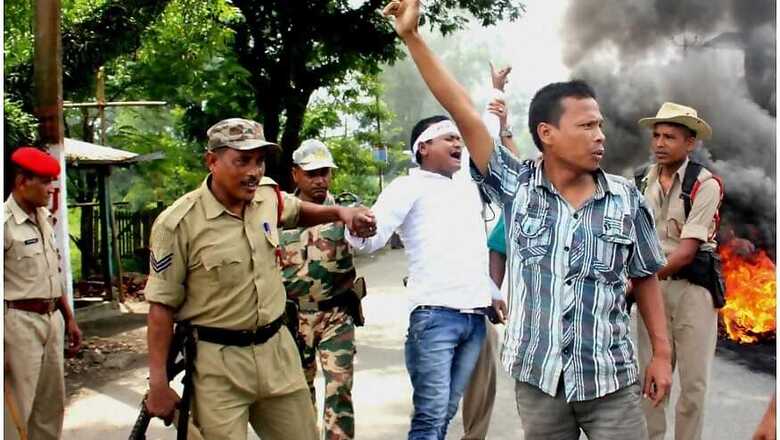
views
Guwahati: It’s black versus white in Assam now. As protests and politics around the Citizenship (Amendment) Bill 2016 is constantly heating up in the state, a new kind of politics has emerged in the state — the politics of black flags versus white flags.
While activists from Krishak Mukti Sangram Samiti (KMSS) and Assam Jatiyatabadi Yuva Chatra Parishad (AJYCP) and many others in a series of protests across the state have started showing black flags to BJP leaders, the saffron camp too has launched a tit-for-tat response to counter the protesters by showing white flags.
Assam’s finance minister Himanta Biswa Sarma, who faced black flags twice this week in Kamrup and Nagaon districts, said, “The black flag protests in the state are bogus. These black flag agitators are being hired. If they (the protesters) show me black flag then I assure that our Yuva Morcha workers will show white flags.”
Terming the black flag protest in Assam are not spontaneous, he said that if one protester resort to such protests, 100 BJP activists will stand up in protest with white flags.
On Thursday, BJP youth wing members staged a rally with white flags at the same spot in Nagaon district, some 100 km from the capital city, where anti-Bill activists waved black at Sarma earlier.
“We have brought a priest with us to purify this spot where our leaders were shown black flags by hired protesters,” said the saffron camp protesters. The incident had occurred at Morigaon bus stand in Nagaon district when Sarma crossed the area to attend an official function.
Sarma who was also shown black flags at Kamalpur area in Kamrup district on Monday, claimed that the ongoing black flag protests in the state were orchestrated. He claimed, “When I cross-checked the identities of the protesters, I found out that they were brought from various locations from the state but not locals. It’s acceptable if the locals show us black flags in anger but why would I accept black flags from someone who is from outside.”
It was not only Sarma, but state’s Chief Minister Sarbananda Sonowal, BJP’s state president Ranjit Dass and party’s MP of Lakhimpur Lok Sabha constituency Pradan Baruah were also shown black flags at various locations in the state recently.
For Congress’s three-time Chief Minister Tarun Gogoi, Sarma’s reaction to the protest was a sign of nervousness. “In a democracy, everyone has the right to show black flag as a symbol of protest. I too faced similar protests when I was shown black flags. But the way BJP wants to dominate and humiliate these agitations is unacceptable. This government is a fascist government which doesn’t value public sentiments. The ruling party has become nervous by seeing the public mood against them.The Bill is not only against the core principle of secularism in our country but also violates the historic Assam Accord,” the former CM said.
He also cited the previous instance in which public intellectual — Hiren Gohain, journalist Monjit Mahanta and KMSS leader Akhil Gogoi — were slapped with sedition charges for allegedly commenting against the ruling government for bringing the Bill.
While the Assam Accord identifies anyone who entered Assam before the cutoff date of March 25, 1971, as a citizen of India, the Citizenship (Amendment) Bill 2016 seeks to grant Indian citizenship to non-Muslims from Bangladesh, Pakistan and Afghanistan who had entered India before December 31, 2014.
One of the signatories of the Accord, the All Assam Students’ Union (AASU), which along with 30 other indigenous organisations from the state and other Northeastern states held “Khilonjiya’s Bojro Ninaad” (lightning call of the indigenous Assamese) against the Bill at Latasil playground in the city on Wednesday, alleged that the state government has been trying to detail the movement against the Bill by stopping students from participating in the protest rally.
“Several educational institutes did not allow their students to participate in the protests in the pretext of some emergency meetings and other functions in the institutes. The chief minister has become so blind in his power hunger that he has forgotten the fact that he himself was a student leader once and led hundreds of students on city streets against Bangladeshi influx in the state. If students joining such protests is a mistake, then Sonowal should first apologize for leading such protest rallies earlier,” said AASU advisor Samujjal Bhattacharjee. AASU even warned that it will not allow free movement of the Bill supporters if needed.
A day before AASU’s protest rally, Sonowal had said that some vested interest groups were motivating the student community of the state to come out on streets instead of concentrating on their studies. The CM said that as a result of such agitations, the future of the state’s students is being dragged to uncertainty.
The protest rally, however, witnessed participation by hundreds of leaders from different indigenous communities and prominent student leaders from other Northeastern states, cultural activists, educationists, Assam agitation victim families, film fraternity personalities, musicians like Zubin Garg and many intellectuals. Everyone unanimously raised slogans against the BJP-led governments at the Centre and the state for bringing in the Bill.
“I’ve been targeted and people are criticising at me left and right. But I want to assure the people of the state that I’ve not become the Chief Minister to lead my own community into a troubled future. I will never betray my state and my people. Our government has been trying to secure the future for the indigenous communities of the state by bringing the Bill and granting Schedule Tribe (ST) status to six communities of the state. Narendra Modi government has taken a practical step to implement Clause 6 of the Assam Accord and formed a committee to suggest means to protect the identity of the indigenous people. No government had taken steps for its implementation,” Sonowal said on Thursday.
However, the nine-member high level committee, formed by Ministry of Home Affairs (MHA), to examine the effectiveness of actions taken since 1985 to implement Clause 6 of the Assam Accord which reads ‘constitutional, legislative and administrative safeguards, as may be appropriate shall be provided to protect, preserve and promote the cultural, social, linguistic identity and heritage of the people of Assam’, has already become redundant after majority of the nominated members decided to walk out of the committee.
Amidst the anti-Bill protests, the union cabinet too had approved to grant schedule tribe (ST) status to six communities in Assam namely Tai Ahom, Koch Rajbongshi, Chutiya, Tea Tribes, Moran and Matak. The state government thereafter has set up a group of minister (GoM) under Himanta Biswa Sarma to expedite the entire process. The GoM is slated to meet and discuss the issue with all stakeholders from January 28 to February 3 to take the issue to its logical conclusion.
On Thursday, a meeting between the state government and leaders of six ethnic communities demanding ST status was too reportedly couldn't reach any positive conclusion.
“The state government came up with the same rhetoric. The CM asked us to keep faith in him but we want to warn the government of not playing with our sentiments anymore. If the government doesn’t take the necessary steps within this month, it will face severe consequences. We are done with the false promises,” the leaders of the six communities announced after the discussion.
Already, an indefinite economic blockade, demanding to scrap the Bill and ST status, started from Sunday by All Moran Students’ Union (AMSU) has paralyzed normal life in various parts of the states in Upper Assam districts as well as Arunachal Pradesh. The restriction on the movements of the commercial vehicles from Tinsukia to various nearby Arunachal’s destinations including Namsai, Changlang and Tirap districts had hit the normal business scenario causing an artificial shortage of essential commodities. Fuel stations in Dibrugarh and Tinsukia districts of the state are running dry as the economic blockade entered its fifth day on Thursday.

















Comments
0 comment